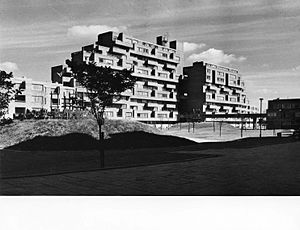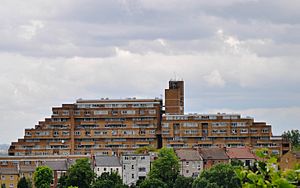Kate Macintosh facts for kids
Quick facts for kids
Kate Macintosh
|
|
|---|---|
| Born |
Catherine Ailsa Macintosh
1937 (age 87–88) Edinburgh, Scotland
|
| Nationality | Scottish |
| Alma mater | Edinburgh College of Art |
| Occupation | Architect |
| Partner(s) | George Finch |
| Awards | Royal Institute of British Architects award, Member of the Order of the British Empire (MBE) |
| Practice | London Borough of Southwark, London Borough of Lambeth |
Catherine Ailsa "Kate" Macintosh (born in 1937) is a Scottish architect. She is well-known for her work designing buildings for local councils. She created Dawson's Heights in Southwark and a special building at 269 Leigham Court Road in Lambeth. This building is now a Grade II listed building, meaning it's protected because of its historical or architectural importance. Kate Macintosh was also honored with an MBE, which stands for Member of the Order of the British Empire, a special award in the UK.
Contents
Kate Macintosh's Journey in Architecture
Kate Macintosh grew up in Edinburgh, Scotland. She studied architecture at the Edinburgh College of Art. This college is now part of the University of Edinburgh. After finishing her studies in 1961, she traveled to Europe. She spent a year learning in Warsaw, Poland, with help from a special scholarship. Then, she worked in cities like Stockholm (Sweden), Copenhagen (Denmark), and Helsinki (Finland).
Designing Public Buildings
Kate returned to the United Kingdom in 1964. For a short time, she worked with a famous architect named Sir Denys Lasdun. They worked on early plans for the National Theatre in London. However, in 1965, Kate decided to work for local councils in London. She wanted to design buildings for the public.
Dawson's Heights: A Special Home Project
Kate Macintosh joined the council in Southwark. There, she designed a large housing complex called Dawson's Heights. This project was in Dulwich. It was built to provide homes for many people. A newspaper called The Observer described it as "one of the most remarkable housing developments in the country." This means it was a very impressive and unique place to live.
Macintosh Court: Homes for the Elderly
In 1968, Kate moved to work for the Lambeth council. Here, she designed a special building at 269 Leigham Court Road. This building was created to provide safe and comfortable homes for older people. It was one of the first buildings in London to be designed using the metric system. Years later, The Guardian newspaper called it "a modernist gem." This means it was a beautiful and important example of modern architecture.
Later Work and Awards
After her time in London, Kate Macintosh worked for other councils. She designed public buildings in East Sussex and Hampshire. These projects included more homes for older people, schools, and fire stations. Later, she started her own architecture business with her life partner, George Finch. Their company was called Finch Macintosh Architects.
In 2005, Kate Macintosh won a special award from the Royal Institute of British Architects. She received this award for designing a playground in Weston, Southampton. She worked on this project with George Finch.
Protecting Important Buildings
In 2012, a group called the Twentieth Century Society tried to get Dawson's Heights protected as a listed building. This would mean it could not be changed or knocked down easily. However, this effort was not successful at that time.
But in 2015, a similar effort was made for 269 Leigham Court Road. This time, it was successful! Historic England officially listed it as a Grade II building. This means it is now protected because of its special design. In June 2016, the building was renamed Macintosh Court. This was done to honor Kate Macintosh, the amazing architect who designed it.



